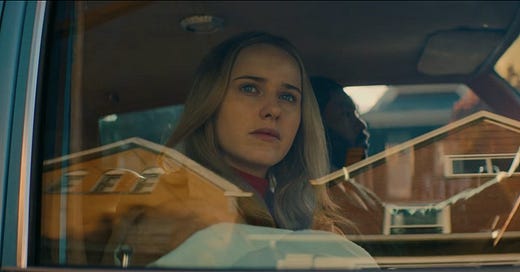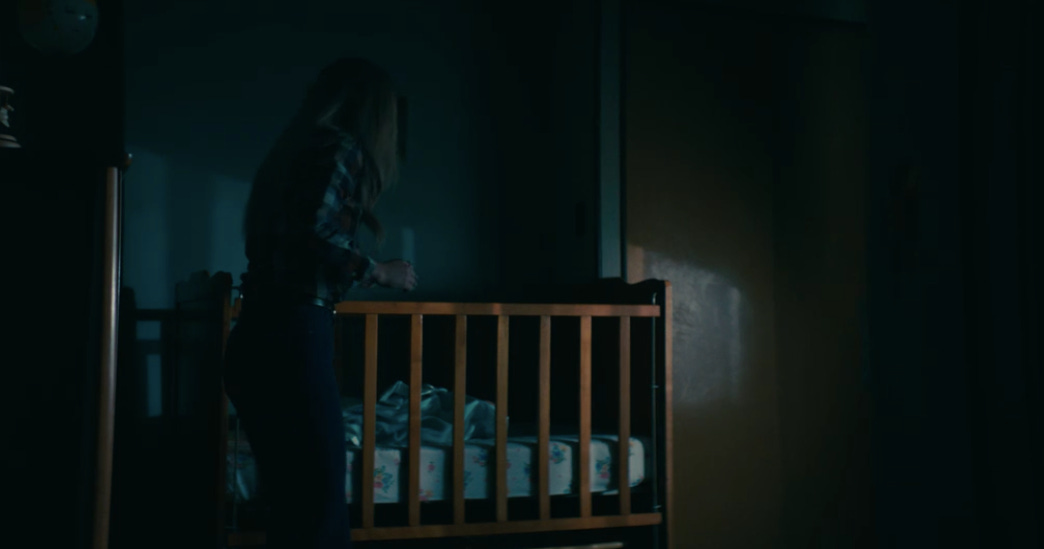Put the Weight On Me: I'm Your Woman (Julia Hart, 2020)
A subversive film noir take on the haze of early parenthood.
The trickiest part of putting a baby to bed is setting it down in the crib. Getting an infant to simply sleep isn’t usually that difficult—some combination of a pacifier, rocking, and shushing (it’s supposed to mimic the sound of blood rushing in the womb) will usually make it happen. The thing that worked best for my own daughter, when she was a newborn, was holding her sideways with her cheek resting against the meat of my forearm just below the crook of my elbow, then bouncing and swaying with her—four bounces to the left, four bounces to the right—while shushing in time with each bounce: sh, sh, sh, sh, shhhh…
But then, even if this worked, what I’d end up with was a baby sleeping in my arms, when what I wanted was a baby sleeping in the crib. To get her from here to there without waking her, what I always did was sort of rock her into the crib, leaning over as far as I could go, making my arms a cradle that swung gently as I lowered her down. Then came the challenge of pulling my arms out from under the baby, transferring her weight to the mattress without any jostling. The hardest part was always the head, a fragile little thing cradled in the palm of my hand—sliding my fingers smoothly across the feathery tufts of hair, then finally tipping the head ever so delicately to the side so that she experienced the transition not as a drop, a sleep-shattering bump, but as a turn, a curling into deeper slumber.
Then, even if you’ve managed all that, there’s the creeping away from the crib, praying that the floorboards won’t creak, praying that the kid will stay sleeping long enough for you to do something for yourself for a change—eat some food, take a shower, or maybe catch some sleep yourself. It’s a moment fraught with hope and dread, a moment poised, on a really bad day, between the certainty that you’ve got this, you can survive this, you might even be a little good at this parenting thing—and the despair of realizing that you don’t know what you’re doing, that you’re drowning, that every decision you’ve ever made in your life including the decision to have kids has been a terrible mistake.
It’s not a moment I’ve seen much of in movies—much less crime movies. But I’m Your Woman isn’t your usual crime story. It turns the genre inside-out by following a character usually relegated to the sidelines, the gangster’s moll. (The film is an inversion of Michael Mann’s Thief, possibly even taking its title from Tuesday Weld’s line to James Caan when he sends her away.) Jean (Rachel Brosnahan) is married to Eddie (Bill Heck), a figure we don’t see much of but who we know is up to no good, part of some criminal enterprise or other. One day he brings home a baby, Harry, and tells Jean that he’s theirs. Jean doesn’t ask where he came from—she’s learned not to ask questions.
Then, one night, Eddie goes out and doesn’t come back. Who does come back is a guy from Eddie’s crew. He tells her the job went bad, shoves a pile of money at her, then tells her to take the baby and run. He sends her with Cal (Arinzé Kene), a man who might be an old partner of Eddie’s but who has a quiet gentleness to him, a kindness that Eddie never had.
What follows is not the expected flurry of car chases and shootouts (though there is a bit of that), but a mining of smaller moments that any parent would recognize from the infant years. That time I went on a road trip and the baby just would not stop crying in the motel. The time a neighbor came over and saved me with a home-cooked meal when I was too exhausted to even see straight. The time I broke down crying to a stranger at the laundromat.
It’s still a crime film—just not the kind of crime film we’re used to. Rather, it takes the tropes and conventions of film noir and puts them to thrilling new uses, charting a beleaguered woman’s journey through the confusions of early motherhood toward an acceptance of the life—and the child—she’s been saddled with.
Film noir is a slippery genre, difficult to definitively classify. Noir is broadly characterized by a concern with crime, the underworld, and by some stylistic markers: dark alleyways, a play of light and shadow. Beyond that, things get a little hazy. My own favored definition of noir characterizes the genre by its relationship to mystery, the deliberate withholding of narrative information. A common feature of crime stories, mystery is more than the audience’s not knowing what is going to happen next; it’s an inability to understand something crucial of what is happening right now, or something that happened at the beginning of the story: a killer’s identity, the reason or motive for some violent occurrence, the angles being played by each party to the plot at hand. In this way, crime fiction is a genre inherently concerned with what we know, how we know it—and how we live our lives when we don’t yet know all we need or want to know.
Noir, like much crime fiction, concerns itself with mystery—but the mystery is existence itself; the mystery is ongoing, not confined to the beginning of the story; the protagonist is embedded in the midst of its confusions rather than pondering them from the outside; and the mystery is not so much solved as it is survived, endured, made peace with. The classic noir plot features a gangster or a cop or an ordinary citizen in over his head, a cog in a machinery he only vaguely understands, in thrall to forces beyond his ken. In the face of this mystery, the noir hero is left with the moment-to-moment struggle to exist, with cynicism—and with his code.
I say he because the noir hero is too often a man—but by flipping the script, placing Jean at the center and Eddie at the margins, I’m Your Woman deepens the existential stakes. There is, arguably, a conventionally suspenseful and twisty crime plot happening somewhere in the universe of this film. But Jean is not a part of it. She knows that something went bad, Eddie killed the wrong guy, and now there’s a whole city’s worth of mobbed-up goons trying to find him. There are hints of an organized crime power vacuum, perhaps even a war. There are tense meetings, dance club shootouts, car chases.
We don’t understand much of this, though, because we’re not meant to. We’re meant to stay with Jean, who’s been kept in the dark all this time, who’s had the meaning of the story withheld from her. People are after Eddie; they’re after her too. The rest hardly matters.
She doesn’t need to know the details—maybe she doesn’t even want to know. She’s got her code. It’s the same as any parent’s.
Keep the baby safe. Get some sleep. Stay alive.
The first few months after my daughter was born, I had a recurring dream—a waking dream. How it went was, I’d wake up (or half wake up) thinking that the baby was in the bed, that I was lying on top of her, that I was hurting her. Panicked, I’d cradle her in the darkness, waiting for my eyes to adjust so I could see if she was okay. At some point, I’d wake up the rest of the way and realize I was cradling a pillow in my arms. The baby was fine, sleeping peacefully in her bassinet.
I tell this story because I think it captures something of the haze of early parenthood—and of the strangeness of the little creatures that enter into our lives. The way we love them and fear for them and even fear them, a little, in the beginning.
In I’m Your Woman, baby Harry is quite literally strange to Jean: he’s not hers. He’s a mystery. Eddie’s a mystery, too—a thief, or maybe a killer. Jean is stuck in a life she fundamentally doesn’t understand, married to a man who lives a secret life, caring for a child of unknown origin. Was Harry kidnapped? Bought? Orphaned, the son of someone Eddie killed? Jean doesn’t know. All she knows is that he’s hers to care for, hers to hold, hers to comfort and make laugh, hers to feed and rock to sleep and set gingerly in the crib. Her burden, her weight to carry.
It’s not so different from the phenomenon that many new mothers—many new parents—report: of not liking their babies very much at first, of not connecting with them, and of feeling incredibly guilty about that fact. It reminds that I once, nightly, mistook a pillow for my own infant daughter—and cradled that pillow like it was the most precious thing in the universe.
Jean doesn’t know where Harry came from. But she cares for him anyway. She is, by some mystery, his true mother.
As for the rest of it—who knows? We live not fully understanding the story of our own lives, not understanding the movements of choice and fate and circumstance that somehow led us here, to this place we never quite intended to be. And maybe part of us wants to solve that mystery, to figure out what happened behind the curtain, to unravel every scheme and plot and double-cross—only we can’t. It’s not meant to be solved. The only thing to know about that mystery is that it doesn’t care about you, that it’ll kill you if you’re not careful.
Surviving is enough—surviving, and coming home at the end of the day to the baby, the strange little being who came into your life by some mechanism you still don’t fully grasp. The one given to you to hold, to carry. Maybe you still don’t know what he needs. Maybe he cries, maybe he won’t sleep, maybe you’re this close to losing it.
But at some point you choose to love the child anyway, and it’s the choosing that makes this love a part of your code. A piece of the thing you hold against the mystery.
And this love, this responsibility—it’s a weight you can carry.
If you enjoyed this newsletter, please consider subscribing—or share The Movie Never Ends with a few friends who might be interested.
You can also leave a comment to let me know you’re here, or even suggest a movie you’d like me to talk about in a future newsletter.







